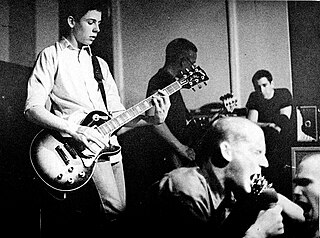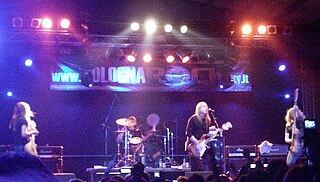Related Research Articles

Hardcore punk is a punk rock music genre and subculture that originated in the late 1970s. It is generally faster, harder, and more aggressive than other forms of punk rock. Its roots can be traced to earlier punk scenes in San Francisco and Southern California which arose as a reaction against the still predominant hippie cultural climate of the time. It was also inspired by Washington D.C. and New York punk rock and early proto-punk. Hardcore punk generally disavows commercialism, the established music industry and "anything similar to the characteristics of mainstream rock" and often addresses social and political topics with "confrontational, politically-charged lyrics."
Thrash metal is an extreme subgenre of heavy metal music characterized by its overall aggression and often fast tempo. The songs usually use fast percussive beats and low-register guitar riffs, overlaid with shredding-style lead guitar work. The lyrical subject matter often includes criticism of The Establishment and concern over environmental destruction, and at times shares a disdain for Christian dogma with that of black metal. The language is typically direct and denunciatory, an approach borrowed from hardcore punk.
The new wave of British heavy metal was a nationwide musical movement that started in England in the mid-1970s and achieved international attention by the early 1980s. Journalist Geoff Barton coined the term in a May 1979 issue of the British music newspaper Sounds to describe the emergence of new heavy metal bands in the mid to late 1970s, during the period of punk rock's decline and the dominance of new wave music.

Kerrang! is a British weekly magazine devoted to rock, punk and heavy metal music, currently published by Wasted Talent. It was first published on 6 June 1981 as a one-off supplement in the Sounds newspaper. Named after the onomatopoeic word that derives from the sound made when playing a power chord on a distorted electric guitar, Kerrang! was initially devoted to the new wave of British heavy metal and the rise of hard rock acts. In the early 2000s, it became the best-selling British music weekly.
Acid rock is a loosely defined type of rock music that evolved out of the mid-1960s garage punk movement and helped launch the psychedelic subculture. Named after lysergic acid diethylamide (LSD), the style is generally defined by heavy, distorted guitars, lyrics with drug references, and long improvised jams. Much of the style overlaps with 1960s garage punk, proto-metal, and early heavy, blues-based hard rock.

Angel Witch are a British heavy metal band which formed in London in 1976 as part of the new wave of British heavy metal (NWOBHM) movement.

Sounds was a UK weekly pop/rock music newspaper, published from 10 October 1970 to 6 April 1991. It was known for giving away posters in the centre of the paper and later for covering heavy metal and punk and Oi! music in its late 1970s–early 1980s heyday.
Neal Kay is a former London-based disc jockey, who was an important factor in the rise of the new wave of British heavy metal (NWOBHM), along with Tommy Vance, in the late 1970s and early 1980s.
White Spirit were an English heavy metal band from Hartlepool, best remembered for guitarist Janick Gers who went on to play with Ian Gillan, Bruce Dickinson, and ultimately, Iron Maiden. Other members of the band were Bruce Ruff (vocals), Malcolm Pearson (keyboards), Phil Brady (bass), and Graeme Crallan (drums) and Mick Tucker (guitars).

Girlschool are a British rock band that formed in the new wave of British heavy metal scene in 1978. Frequently associated with contemporaries Motörhead, they are the longest-running all-female rock band, still active after more than 40 years. Formed from a school band called Painted Lady, Girlschool enjoyed strong media exposure and commercial success in the UK in the early 1980s with three albums of 'punk-tinged metal' and a few singles, but lost their momentum in the following years.
Ian Penman was a British radio broadcaster, television producer, director, actor and scriptwriter who also worked as a print and online journalist under the byline Ian Ravendale.

Terrorizer was an extreme music magazine published by Dark Arts Ltd. in the United Kingdom. It was released every four weeks with thirteen issues a year and featured a "Fear Candy" covermount CD, a twice yearly "Fear Candy Unsigned" CD, and a double-sided poster.
Brian Slagel is an American music executive. He is the founder and CEO of the independent record label Metal Blade Records. Slagel is known for having initiated the Metal Massacre series of compilation albums in 1982, the first of which included the first commercial recording by Metallica. Metal Blade has since released seminal albums by Slayer, Mercyful Fate, Cannibal Corpse, Fates Warning, Amon Amarth and The Black Dahlia Murder, among others.

Wild Cat is the debut album by the British heavy metal band Tygers of Pan Tang. It was released in 1980 on MCA Records, and reached #18 on the UK album chart. The album was re-issued in 1989 in a double-LP package with Spellbound, and on CD in 1997 with bonus tracks.
Rogue Male are a British heavy metal band, formed in 1984.

The Dictators Go Girl Crazy! is the debut album by American punk rock band The Dictators. It was released in March 1975 and is considered one of the first examples of punk rock.
Crossover thrash is a fusion genre of thrash metal and hardcore punk. The genre lies on a continuum between heavy metal and hardcore punk. Other genres on the same continuum, such as metalcore and grindcore, may overlap with crossover thrash.

Heavy metal guitar is the use of highly-amplified electric guitar in heavy metal. Heavy metal guitar playing is rooted in the guitar playing styles developed in 1960s-era blues rock and psychedelic rock, and folk harmonic traditions and it uses a massive sound, characterized by highly amplified distortion, extended guitar solos and overall loudness. The electric guitar and the sonic power that it projects through amplification has historically been the key element in heavy metal. The heavy metal guitar sound comes from a combined use of high volumes and heavy distortion.
Alan Lewis was a British music journalist and editor.
References
- ↑ "Geoff Barton, behind the wheel". RockCritics.com.
- ↑ Steve Waksman, This Ain't the Summer of Love: Conflict and Crossover in Heavy Metal and Punk (Los Angeles, CA: University of California Press, 2009), 173-175.
- ↑ Mick Wall, Run to the Hills: Iron Maiden, the Authorised Biography (London: Sanctuary, 2000), 88. See also Steve Waksman, This Ain't the Summer of Love: Conflict and Crossover in Heavy Metal and Punk (Los Angeles, CA: University of California Press, 2009), 330, note 7.